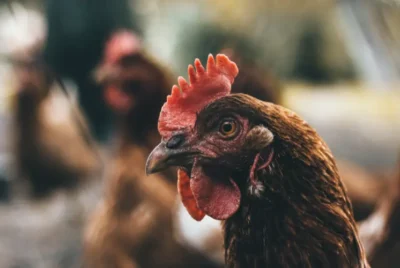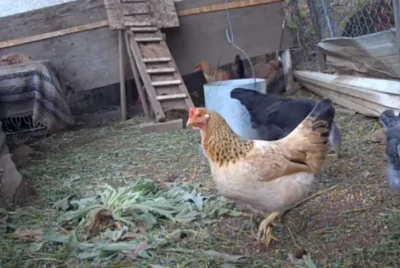Rhode Island White Caring Guide
Rhode Island Whites are a classic chicken breed known for their resilience, adaptability, and distinctive appearance. Whether you’re raising them for eggs, meat, or as pets, these birds can be a delightful addition to your backyard flock.
However, just like any livestock, they come with specific needs. So, I created this guide to provide comprehensive care insights to ensure this classic breed thrives.
Breed Overview
- Origin: United States
- Egg Production Ability: Good
- Broodiness: Low
- Meat Production: Good
- Cold Tolerance: Poor-Exceptional (varies with comb size)
- Heat Tolerance: Moderate-Good
- Predator Evasion: Moderate-Good
- Foraging Ability: Good
- Toleration for Confinement: Moderate-Good
- Temperament: Friendly to Docile
- Lifespan: 5–8 years
- Aggression toward flock members: Moderate
- Noise Level: Moderate-High
- Care Level: Moderate to high
Origins of Rhode Island White Chicken
The Rhode Island White originated in Rhode Island, USA, in 1888. J. Alonzo Jacoy, a poultry farmer from Peacedale, developed this breed, aiming for a chicken that excelled in both egg and meat production.
To achieve this, he crossbred Cochins for their meat, Rose Comb White Leghorns for their prolific egg-laying, and Wyandottes, which are known as a sturdy, dual-purpose breed. The result was the versatile and hardy Rhode Island White Chicken.
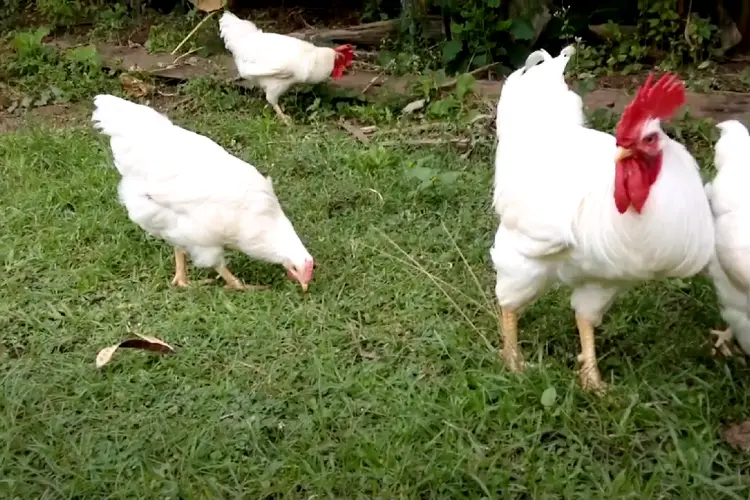
Physical Appearance
Rhode Island Whites are white chickens with yellow legs and beaks. Their body looks like a brick, similar to their relatives, the Rhode Island Reds. They have a type of comb on their head called a “rose comb,” but some nowadays have bigger, single combs. Their head is more flat than round, which distinguish them from White Plymouth rock chickens or White Wyandottes. They have medium red flaps (called wattles) under their beak, reddish bay eyes, and red ear parts.
Their weight can vary depending on whether it’s a male or female. Generally, roosters, or males, of this breed tip the scales at around 8.5 pounds. On the other hand, hens, or females, are a bit lighter, typically weighing in at about 6.5 pounds. It’s important to note that these weights are for the standard breed, and if you come across the miniature version, known as bantam, they’ll be considerably smaller.
What Do Rhode Island White Chicks Look Like?
Rhode Island White chicks are cute little birds that are mostly yellow with a bit of white mixed in. As they grow, they’ll turn all white, but when they’re just hatched, they look like fluffy yellow cotton balls.
Read also: An In-depth Look at the Rhode Island Blue Chicken Breed
Rhode Island White Chicken Characteristics
Foraging and Health
One of the first things to note about Rhode Island Whites is their remarkable foraging abilities. These chickens love to explore and find their own food, which can help reduce feed costs. Not only are they efficient foragers, but they also have a robust immune system, making them resistant to various diseases and illnesses.
Friendly Nature
Adding to their appeal is their friendly disposition. These chickens are not just easy-going; they are sociable, making them suitable for families. Their charming personality also makes them standout stars in poultry shows. They fit in comfortably in both confined spaces and free-range environments, although they can occasionally show aggressive tendencies.
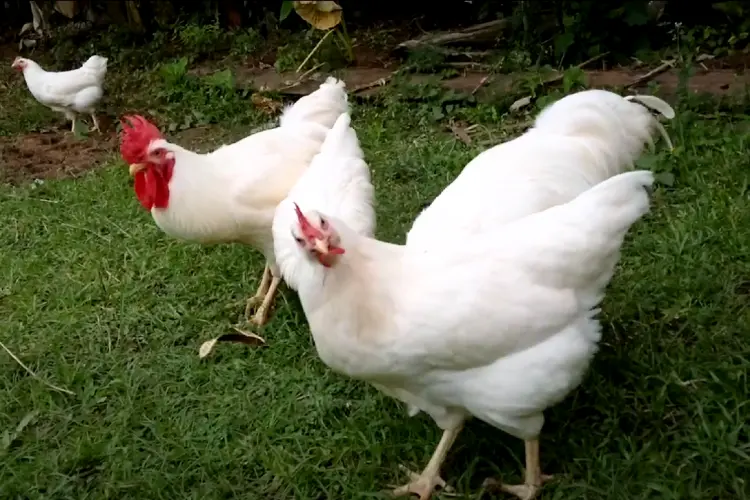
Temperature Tolerance
When it comes to handling different weather conditions, Rhode Island Whites are versatile. They’re especially heat tolerant, a feature not commonly found in fluffy chicken breeds. However, they’re not entirely defenseless against the cold, thanks to their own feathering. But be cautious with your choice, as single-combed varieties are more susceptible to frostbite than rose-combed ones.
Social Interaction
Rhode Island Whites are incredibly friendly to humans, often forming bonds with their caretakers. However, this amiable nature doesn’t extend to other chicken breeds. In a mixed flock, they might get aggressive, especially with chickens that don’t resemble them.
Vocal Tendencies
If you’re looking for quiet birds, this chicken breed might surprise you with its chattiness. They are quite vocal, which is advantageous on a farm as they alert against potential threats. But in urban settings, this trait might not be ideal.
Read also: Understanding Chicken Communication: Sounds Explained
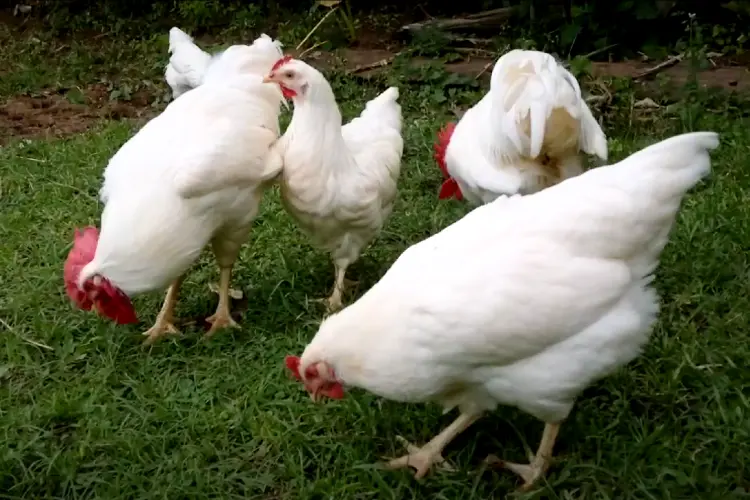
Sex-Linking Advantage
Urban chicken keepers should rejoice! Many Rhode Island White crosses are sex-linked, meaning you can determine the chick’s gender right after hatching. This feature is invaluable when roosters aren’t allowed, ensuring you only raise hens.
Rhode Island White Egg Laying
Rhode Island White chickens are versatile birds often raised for both their eggs and their meat. These dual-purpose chickens come in varieties specifically bred for egg-laying or meat production. The egg-focused variety typically produces large to extra-large light brown to dark brown eggs.
On average, a Rhode Island White hen will lay about four to five eggs every week, totaling around 200-250 eggs annually. During winter, these hens don’t disappoint and continue to lay eggs consistently. While they’re prolific layers, they generally aren’t inclined to sit on their eggs to hatch them, meaning they rarely go broody.
On the other hand, those meat birds mature quickly, offering a substantial weight of 6.5–8.5 lbs, and are recognized for their delicious taste.
For those looking to raise Rhode Island White chicks from eggs, having a top-quality chick brooder can make all the difference in ensuring the young birds grow up healthy and strong. Dive deep into the options available with our The Best Chick Brooder Guide: 2023’s Hot Picks Revealed.
Are Rhode Island Whites Rare?
Yes, Rhode Island White chickens are considered a rare breed, especially the original Rose Comb Rhode Island White that the American Poultry Association admitted. Although they share a name with the more popular Rhode Island Red, the White variety is much less common.
Over the years, commercial farming trends have favored other breeds, causing their number to diminish. Efforts by poultry enthusiasts and heritage breed conservation groups are ongoing to preserve and promote this unique and valuable breed.
Make Your Chickens Happy With Chicken Raising 101
In caring for Rhode Island White chickens, it’s evident that they are a resilient and versatile breed, suitable for both egg production and meat. Their friendly nature makes them one of the best chickens for backyard poultry enthusiasts and family farm alike. Providing them with adequate shelter, especially during colder months, and allowing them space to forage will ensure they thrive and remain a reliable source of fresh eggs and quality meat.


